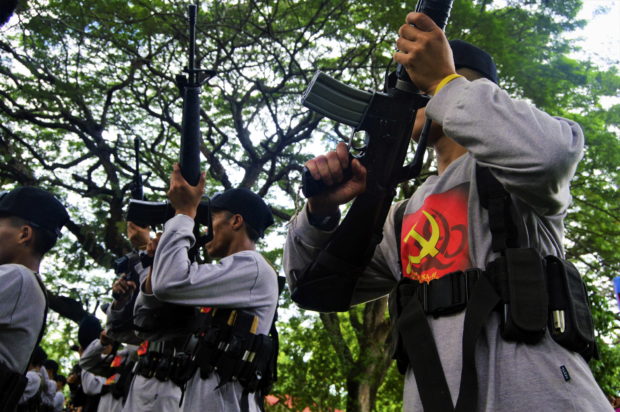
Young New People’s Army (NPA) rebels stand in formation during the recent anniversary of the Communist Party of the Philippines (CPP) in a town in Misamis Oriental province on Dec. 26, 2016. (File photo by JIGGER J. JERUSALEM / Inquirer Mindanao)
MANILA, Philippines — The Communist Party of the Philippines (CPP) on Sunday challenged Presidential Peace Adviser Carlito Galvez Jr. to explain how the long overdue peace talks between the government and the communist rebels can proceed if the latter’s negotiators continue to be detained and are designated as terrorists by the government.
In a statement, CPP spokesperson Marco Valbuena said it “smacked of bad faith” that the government continues to call the National Democratic Front of the Philippines (NDFP)’s top leaders, including its chair Luis Jalandoni, “terrorists” while also expressing willingness to negotiate with them to work on a final peace agreement to end the longest insurgency in Asia.
Both the NDFP and the government had signed a joint statement in Oslo, Norway, expressing their intent to restart the peace talks, which have stalled since 2017 under former President Rodrigo Duterte.
But before they could formally start the process, the NDFP had said they planned on raising “four issues,” including the removal of the NDFP leadership and Jalandoni from the state’s terrorist list, and the release of all political prisoners and NDFP consultants so they could join the negotiations.
Galvez, however, balked at these “issues” and asked the NDFP to “respect the Joint Statement and Oslo Joint Communique and not make preconditions or release propaganda that will water down the peacebuilding efforts of the previous and current administrations.”
READ: House members back peace talks with rebels
READ: Peace talks with NDFP ‘an agreement with the devil,’ VP tells Marcos
READ: Groups slam VP Duterte for opposing gov’t peace talks with NDFP
Not preconditions
NDFP negotiating chair Julie de Lima clarified that these are not preconditions, rather issues that need to be discussed before formal talks can proceed.
For its part, the CPP agreed that these were not conditions but rather “practical issues, which if unresolved, make it very difficult to even imagine how peace talks can proceed.”
Before this, the government has maintained a stance to not “negotiate with terrorists”—a stance that could strain their efforts and reflect “more fundamental questions” about the peace talks, Valbuena said.
“If Galvez does not even want to hear about the clamor to remove the ‘terrorist designation’ of CPP/NPA (New People’s Army)/NDFP, will it even listen to the basic and urgent demands of the people for land reform and national industrialization and other key measures for social justice and national sovereignty?” he asked.

